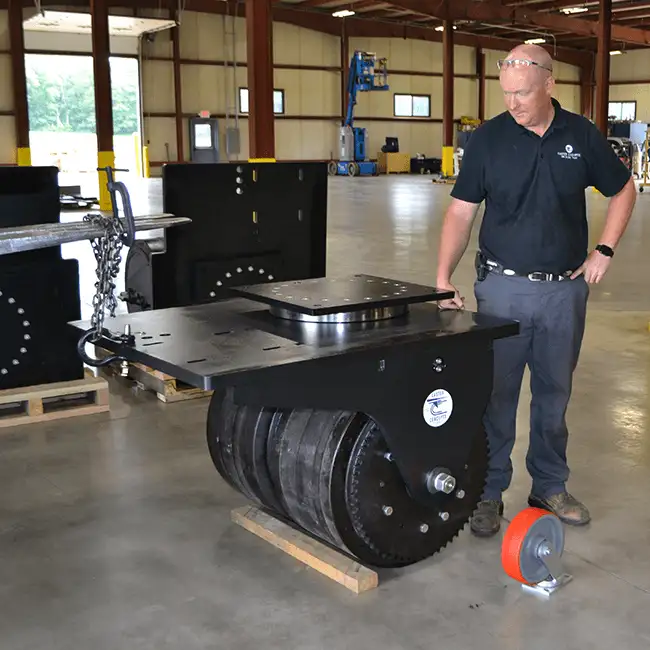

A caster is made up of an undriven, single, double, or compound wheel mounted to a rig. Caster wheels come in different materials, sizes, tread widths, and load ratings to give your equipment mobility in many kinds of work environments.
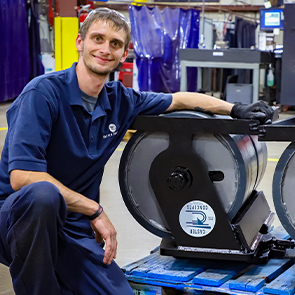
In general, all industrial casters (including the wheel) fall under a heavy duty caster classification. However, within this heavy duty rating there are different weight capacities based on the caster and wheel’s construction and overall durability. From heavy duty to extra heavy duty, the ranges can go from 2,000 lbs. to 50,000 lbs. and up.
Defense contractors, aerospace plants, shipyards, aviation factories, heavy equipment manufacturers, and any material handling operation involving the movement of extreme loads are where these high-capacity casters are in their element
The needs of plants, warehouses, and factories vary, but there are also some shared considerations. Worker safety, a cart’s weight capacity, and the push force required can all come into play.
All these factors help determine what type of wheel and wheel material you need. In our experience, perhaps the best compromise between load capacity and floor protection is offered by polyurethane treads. Polyurethane is very popular due to its many beneficial characteristics (chemical resistance, heat resistance, rolling resistance, etc.) that you can formulate a wheel to your specifications. There is a variety of Durometers (wheel hardness) that you can choose from depending on your needs.
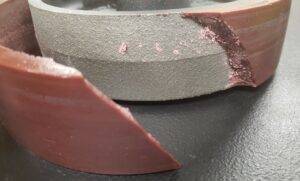 When excess loads or faster towing speeds stresses are put on a polyurethane wheel, failures can happen. If the poly is chunking off the wheel or completely delaminating from the core, you probably have a weight or speed issue. Or, a combination of both. Our blog, Three Common Causes of Polyurethane Wheel Failure addresses these issues.
When excess loads or faster towing speeds stresses are put on a polyurethane wheel, failures can happen. If the poly is chunking off the wheel or completely delaminating from the core, you probably have a weight or speed issue. Or, a combination of both. Our blog, Three Common Causes of Polyurethane Wheel Failure addresses these issues.
The fix is to look at a polyurethane that has a higher weight capacity or a poly that is made for higher heat. You can also go to a thicker poly if you are currently using the ½” thick standard.
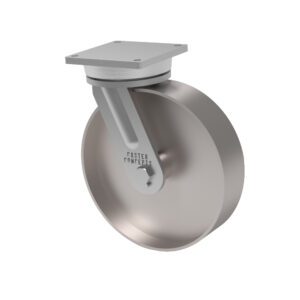 The hardness or softness of your wheels has specific benefits. Carts with wheels made from harder materials are generally easier to get moving than wheels made from softer materials. Harder wheels have a lower rolling resistance which makes them easier to push. However, wheels made from softer materials are generally quieter and more forgiving because they transmit less vibration. Forged steel, iron, and mold-on rubber are also some other available options when choosing wheels.
The hardness or softness of your wheels has specific benefits. Carts with wheels made from harder materials are generally easier to get moving than wheels made from softer materials. Harder wheels have a lower rolling resistance which makes them easier to push. However, wheels made from softer materials are generally quieter and more forgiving because they transmit less vibration. Forged steel, iron, and mold-on rubber are also some other available options when choosing wheels.
Steel or iron wheels are excellent in industrial applications where strength, capacity, and operational efficiency are critical. These casters are perfect for hauling heavy loads, and their steel design resists corrosion and failure better than many other materials. In high-temperature applications up to 600° F, both cast iron and steel wheels work. As temperatures rise past 600° F, the caster’s load rating is reduced as the steel iron loses strength.
FORGED STEEL WHEELS
|
CAST IRON WHEELS
|
Because low profile caster wheels keep the center of gravity lower, they can typically withstand higher amounts of weight associated with medium-duty industrial applications. In fact, many can support 1,000 pounds or more each.
This range is ideal for heavy carts, racks, and even certain types of vehicles. Before choosing a low profile caster for your application, be sure that you fully understand the load’s maximum capacity. Then, choose a caster that supports slightly more than this amount to improve safety and caster longevity.
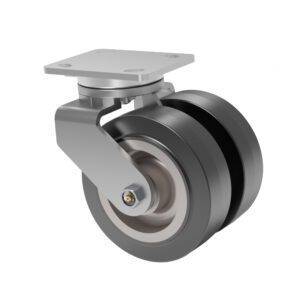 Keeping a significantly large load close to the ground can lower the load’s center of mass and make it safer during transport. For this reason, ultra-heavy–duty casters with dual-wheel options are fantastic for larger, taller carts in many industries. They provide extra stability because they allow for multiples of smaller wheels, with the added support for loads that are impossible to balance perfectly.
Keeping a significantly large load close to the ground can lower the load’s center of mass and make it safer during transport. For this reason, ultra-heavy–duty casters with dual-wheel options are fantastic for larger, taller carts in many industries. They provide extra stability because they allow for multiples of smaller wheels, with the added support for loads that are impossible to balance perfectly.
While we offer a comprehensive catalog, there are many times when a custom application solves a unique application. That’s why we provide Beyond Standard service, offering casters custom built to your exact specifications.